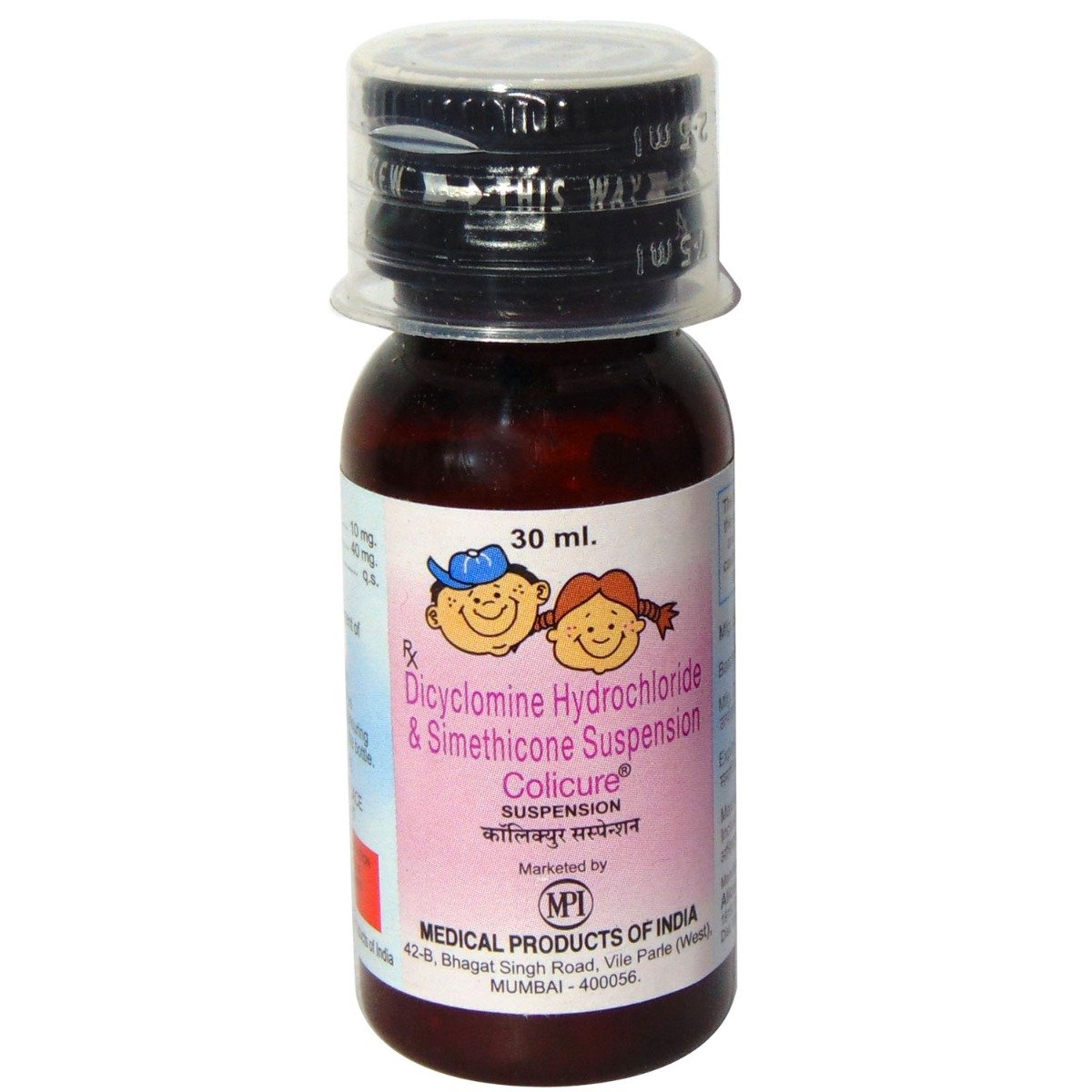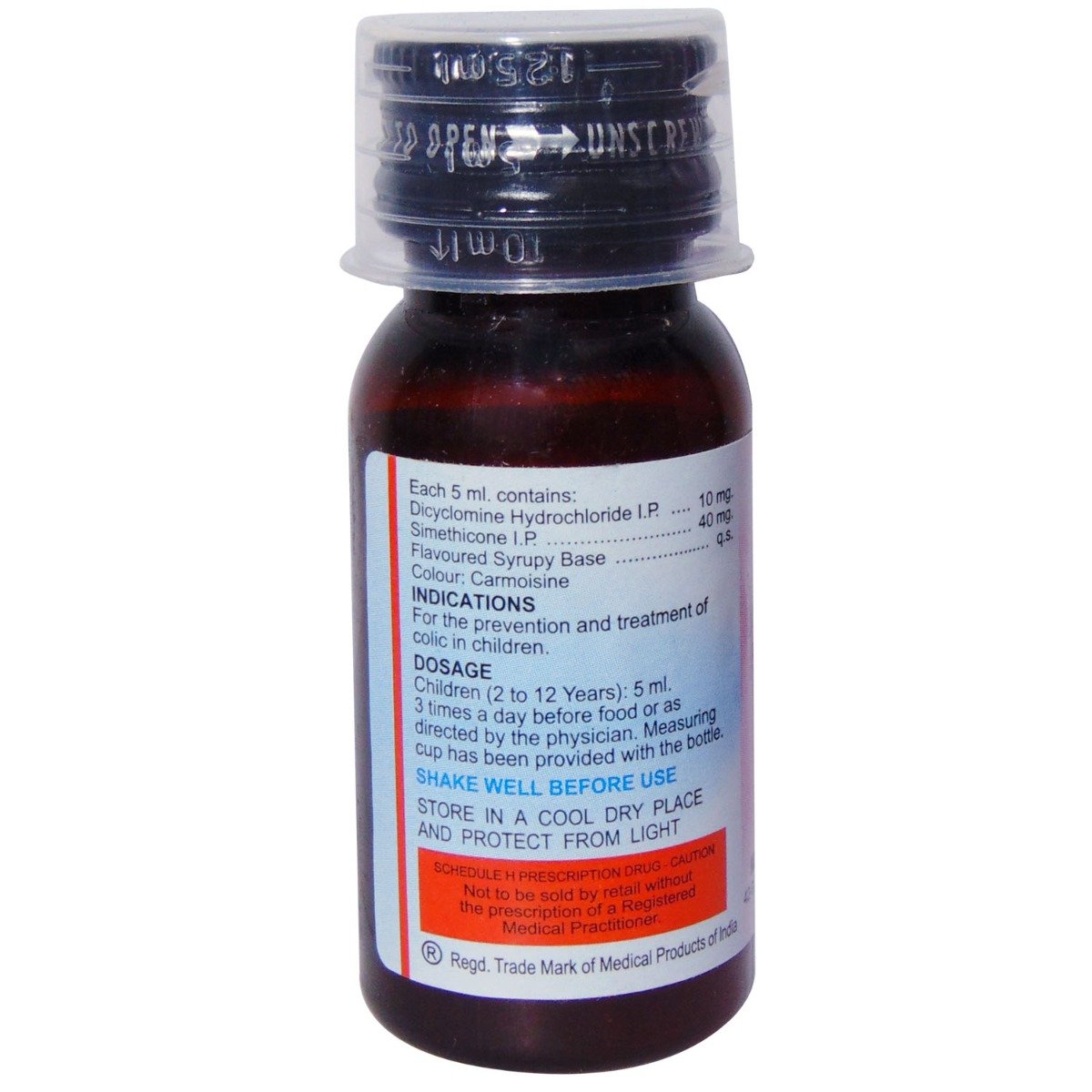Colicure Syrup 30 ml
MRP ₹45
(Inclusive of all Taxes)
₹5.4 Cashback (12%)
Provide Delivery Location
Online payment accepted
 Prescription drug
Prescription drugWhats That
Composition :
Manufacturer/Marketer :
Consume Type :
Expires on or after :
Return Policy :
About Colicure Syrup
Colicure Syrup belongs to the class of ‘antispasmodic/anticholinergic/anti-muscarinic agents’, primarily used to treat functional bowel or irritable bowel syndrome (IBS) and acid peptic disease. Colicure Syrup reduces spasms (sudden involuntary contraction) of the muscles in the stomach and intestines. It effectively relieves stomach cramps, pain in the stomach and intestine, bloating, wind and discomfort.
Colicure Syrup contains ‘Dicyclomine’, also known as Dicycloverine. Dicyclomine belongs to the class of ‘anticholinergic/anti-muscarinic agents’ with antispasmodic activity. Colicure Syrup blocks the activity of acetylcholine (acetylcholine is a neurotransmitter that sends signals to nerve cells) by binding to muscarinic receptors on smooth muscle. This process helps in relaxing the smooth muscles and inhibits natural gut movements. Thus Colicure Syrup prevents spasms in the muscles of the stomach and intestines.
Your doctor will advise the appropriate dose that suits your medical condition. Common side effects of Colicure Syrup include dizziness, drowsiness, light-headedness, weakness, blurred vision, dry eyes, dry mouth, nausea, constipation and abdominal bloating. These side effects may not occur in every patient using this medication and differ individually. If the side effects persist longer or worsen, please seek a doctor’s advice.
Let your doctor know if you are sensitive or allergic to any medications. Before using Colicure Syrup, let your doctor know if you have liver, kidney or heart diseases and any other medical history. Colicure Syrup may cause blurred vision, dizziness and drowsiness, hence do not drive or operate machinery until you feel better. Pregnant and breastfeeding women should consult their doctor before using Colicure Syrup. This medicine is not recommended for use in children below six months of age.
Uses of Colicure Syrup
Directions for Use
Key Benefits
Colicure Syrup contains ‘Dicyclomine’, also known as Dicycloverine. Dicyclomine is an ‘anticholinergic/anti-muscarinic agent’ with antispasmodic activity. Colicure Syrup effectively treats irritable bowel syndrome (IBS) and acid peptic disease. It works by blocking the activity of acetylcholine by binding to muscarinic receptors on smooth muscle. This process helps in relaxing the smooth muscles, inhibits the natural gut movements, decreases gastric acid secretion and controls excessive GI secretions. Thus Colicure Syrup prevents spasms in the muscles of the stomach and intestines. Colicure Syrup is also used to relieve stomach cramps, bloating and pain in the stomach and intestine.
Storage
Drug Warnings
Let your doctor know if you are sensitive to Colicure Syrup or its components. Colicure Syrup should be used with caution and only under doctor’s supervision if you have stomach/intestinal problems like slow gut, blockage, heartburn, acid reflux, ulcerative colitis (inflammation of the colon), little or no stomach acid and diarrhoea due to intestine surgeries like ileostomy and colostomy. Also inform your doctor if you have any liver or kidney diseases, urinary retention problems (enlarged prostate), glaucoma, overactive thyroid (hyperthyroidism), high blood pressure, heart diseases, nervous system disorders, drug addiction, myasthenia gravis (neuromuscular disorder) and hiatus hernia (stomach pushes into the chest cavity) before using Colicure Syrup. This medicine may cause blurry vision and sleepiness affecting your mental focus, hence do not drive or operate machinery until you feel better. Let your doctor know if you are planning to conceive, are pregnant or are a nursing mother before starting Colicure Syrup.
Diet & Lifestyle Advise
- Avoid or limit the intake of alcohol and caffeine.
- Manage stress, eat healthily, drink plenty of water, exercise regularly and get plenty of sleep.
- Limit taking high-fibre foods, foods and drinks that contain chocolate, alcohol, caffeine, fructose or sorbitol, carbonated drinks, and fried and fatty foods.
- Avoid having large meals, instead try having small and simpler meals at regular intervals, including fresh fruits and vegetables in your diet.
- Practice yoga and recreation techniques to manage your emotional stress.
- If you are lactose intolerant, avoid using dairy products since they can worsen your IBS.
- If you cannot take dairy products, it is advised to include other calcium-rich foods like leafy greens, beans, nuts and seeds.
- Drink plenty of fluids and dress lightly to prevent heatstroke and dehydration.
- Avoid overly sweating activities like hard exercises and using hot tubs.
Side Effects of Colicure Syrup
- Dizziness
- Drowsiness
- Light-headedness
- Weakness
- Blurred vision
- Dry eyes
- Dry mouth
- Nausea
- Constipation
- Abdominal bloating
Habit Forming
Therapeutic Class
All Substitutes & Brand Comparisons
Author Details
We provide you with authentic, trustworthy and relevant information
FAQs
Colicure Syrup consists of Dicyclomine, an anticholinergic agent that treats irritable bowel syndrome and acid peptic disease. It works by relaxing the muscles and inhibiting natural gut movements, thereby relieving muscle spasms and cramps in stomach and intestine, abdominal pain, constipation and other GI discomforts.
Colicure Syrup should be used with caution and only under doctor’s supervision if you have any liver, kidney or heart diseases, stomach and intestinal problems, nervous system disorders, glaucoma, urinary retention and drug addiction.
Colicure Syrup may make you sweat less and can likely cause heart stroke. Hence, it is advised to limit activities that cause overheat like an exercise in hot weather or using hot tubs. Drink plenty of fluids and dress lightly.
Antacids may lower the absorption of Colicure Syrup and reduce its efficacy. It is advised to take antacid and Colicure Syrup at different times. If you take antacid after meals, please take Colicure Syrup before meals.
If you suffer from IBS, limit taking high fibre foods, foods and drinks that contain chocolate, alcohol, caffeine, fructose, or sorbitol, carbonated drinks, fried and fatty foods. Do not have large meals, instead, try having small and simpler meals at regular intervals, including fresh fruits and vegetables in your diet.
Drug-Drug Interactions Checker List
- ATROPINE
- PRAMLINTIDE
- LINEZOLID
- KETOCONAZOLE
- QUINIDINE
- DIGOXIN
- LEVODOPA
- PHENELZINE
- SELEGILINE
- METHYLENE BLUE
- PROCARBAZINE
- ALPRAZOLAM
- CODEINE
- CETIRIZINE
- DIPHENHYDRAMINE
- CLIDINIUM
Special Advise
- It is advised to monitor your blood pressure and blood glucose levels regularly while using Colicure Syrup.
- Your doctor may suggest diagnostic procedures like endoscopy or colonoscopy to understand your disease and its severity.
Disease/Condition Glossary
Irritable Bowel Syndrome (IBS): It is also termed as IBS colitis, mucous colitis, spastic colon, nervous colon and spastic bowel. It is an inflammatory bowel disease that affects the large intestine. Symptoms of an IBS include abdominal pain, bloating, diarrhoea, mucus in stools, wind, constipation, tiredness, anxiety, depression, heartburn, indigestion and headaches. IBS can be controlled by managing diet excluding certain intolerant foods, lifestyle and stress. It is more commonly found in people in their late teens to early 40s.
Acid peptic disease: It is a digestive function disorder referring to various GI conditions like gastro-oesophageal reflux disease (GERD), gastritis, gastric ulcer, duodenal ulcer and oesophageal ulcer. Acid peptic diseases commonly affect the oesophagus, stomach and duodenum. Symptoms can include abdominal pain, nausea, heartburn, regurgitation (expelling undigested food into the mouth), vomiting, loss of appetite and weight loss.

Have a query?
Alcohol
Safe if prescribed
It is advised to limit alcohol intake to prevent any undesirable side effects of Colicure Syrup and further worsen your disease. Please consult your doctor before using Colicure Syrup.
Pregnancy
Consult your doctor
During pregnancy, Colicure Syrup should be used only when clearly needed. It is advised to consult your doctor if you plan to conceive or already pregnant before starting Colicure Syrup.
Breast Feeding
Consult your doctor
It is not recommended to use Colicure Syrup during breastfeeding. Colicure Syrup can pass into breast milk and cause breathing problems or other undesirable effects in infants younger than six months of age. Please consult your doctor before taking Colicure Syrup if you are a nursing mother.
Driving
Safe if prescribed
Colicure Syrup may cause side effects like dizziness, drowsiness and blurry vision which could affect your ability to focus. Please do not drive or operate machines until you feel better.
Liver
Consult your doctor
Let your doctor know if you have any history of liver diseases or hepatic impairment. Your doctor will weigh the benefits and potential risks before prescribing Colicure Syrup.
Kidney
Consult your doctor
Let your doctor know if you have any history of kidney diseases. Your doctor will weigh the benefits and potential risks before prescribing Colicure Syrup.
Children
Safe if prescribed
Colicure Syrup is not recommended for children younger than six months of age. Your doctor will decide the dose and duration based on your child’s age and medical condition.








